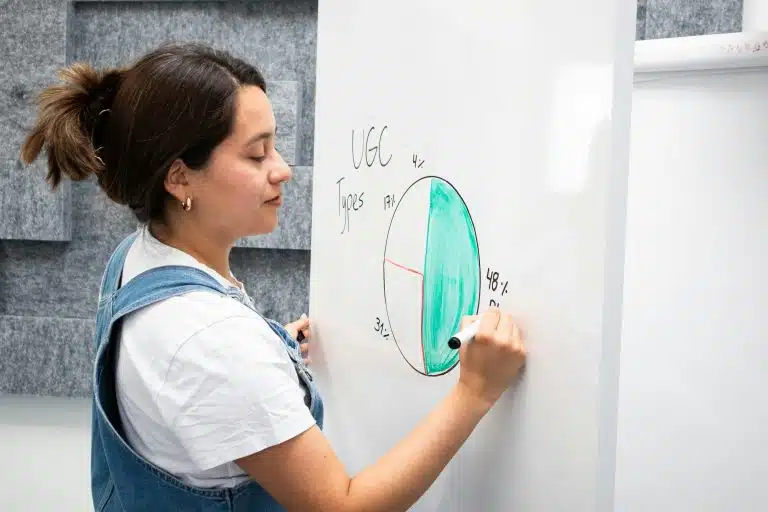Harvard Business School, ranked #6 among all the best business schools in the nation, is where the best and brightest come together to make their mark on the world. But what does it take to get in? Well, the Harvard MBA class profile is a peek into the kind of students the school wants: ambitious, diverse, and ready to lead.
Understanding the Harvard MBA class profile is your first step toward seeing if you’ve got what it takes to make it to this iconic school. From the competitive stats to the backgrounds of the students who made it in, here’s everything you need to know to start planning your application and maybe—just maybe—join the ranks of the next generation of business leaders.
- Harvard MBA Class Profile: By the Numbers
- Harvard MBA Acceptance Rate
- What Harvard Looks for in MBA Students
- Harvard MBA Requirements
- Harvard MBA Application Deadlines
- Frequently Asked Questions
- Takeaways
Harvard MBA Class Profile: By the Numbers
According to their latest data, Harvard received 9,856 applications for its MBA program for the Class of 2026, and only 930 students enrolled. So, what do these students look like?
- 45% of the class is women. Harvard is all about diversity and making sure everyone has a seat at the table.
- 35% of the class is international. This makes the Harvard MBA program truly global.
These numbers show that Harvard values a diverse mix of people and experiences. And if you’re wondering just how global the program really is, keep reading.
Primary citizenship
The primary citizenship breakdown for the Harvard MBA Class of 2026 shows just how worldwide this class is:
|
Primary Citizenship |
Percentage |
| United States |
65% |
|
Asia |
13% |
| Europe |
8% |
|
Mexico, Central & South America |
5% |
| Canada |
3% |
|
Middle East |
3% |
| Africa |
2% |
|
Oceania |
Less than 1% |
With such diversity, it’s clear that Harvard Business School attracts top talent from around the globe. Whether you’re from a small town or a big city, you’re bound to have peers from all corners of the world. It’s one of the reasons why HBS is known for its international perspective.
Race and ethnicity
Harvard’s MBA program has made diversity a key part of its ethos. Here’s a look at the race and ethnicity breakdown for U.S. students in the Class of 2026:
|
Race and Ethnicity |
Percentage |
| Asian American |
25% |
|
Black or African American |
8% |
| Hispanic or Latino |
10% |
|
White |
49% |
| Multi-Race |
4% |
Harvard takes a nuanced approach to diversity. And if you’re wondering whether you’re a good fit for their class, the numbers show that the school looks for a wide range of backgrounds, experiences, and perspectives.
Undergraduate majors
Harvard MBA students come from a variety of academic backgrounds. While many come from business or economics fields, there’s a strong representation from disciplines like engineering and math. Here’s the breakdown:
|
Undergraduate Major |
Percentage |
| Business / Commerce |
24% |
|
Engineering |
22% |
| Economics |
19% |
|
Math / Physical Sciences |
18% |
| Social Sciences |
12% |
|
Arts / Humanities |
5% |
While business and engineering dominate, applicants with diverse academic backgrounds are welcomed and thrive within the program.
Pre-MBA industry experience
Before stepping into Harvard, MBA candidates bring with them solid experience from a wide range of industries. Whether it’s consulting, technology, or healthcare, the diversity of professional backgrounds is key to fostering the collaborative environment Harvard is known for:
|
Pre-MBA Industry |
Percentage |
| Consulting |
18% |
|
Technology |
12% |
| Venture Capital / Private Equity |
16% |
|
Financial Services |
10% |
| Consumer Products / Retail / E-Commerce |
9% |
|
Manufacturing / Industrial / Energy |
9% |
| Healthcare / Biotech |
8% |
|
Military |
5% |
| Nonprofit / Government / Education |
6% |
|
Media / Entertainment / Travel |
4% |
| Services |
2% |
The broad spectrum of industries represented means Harvard values experience from every sector and looks for applicants who can bring new perspectives to the table.
Harvard MBA average work experience
On average, Harvard MBA students come to the program with 5 years of full-time work experience. This experience is crucial, as it helps students engage with the curriculum on a deeper level and contribute meaningfully to classroom discussions.
Harvard MBA average GPA
The average GPA for the Class of 2026 is a solid 3.69, which means these students came from strong academic backgrounds. But don’t let that number intimidate you! Harvard looks at more than just grades. The school values leadership, creativity, and a drive to make an impact, which brings us to the next point.
Harvard MBA Acceptance Rate
The Harvard MBA program has a highly competitive acceptance rate, and understanding its historical trends can help you gauge what it takes to be admitted. Below is a breakdown of the acceptance rates over the past few years:
|
Harvard MBA Class |
Applications | Acceptance Rate |
| Class of 2026 | 9,856 |
12% |
|
Class of 2025 |
8,149 | 14% |
| Class of 2024 | 8,264 |
15% |
|
Class of 2023 |
9,773 | 13% |
| Class of 2022 | 9,304 |
13% |
As you can see, the Harvard MBA acceptance rate has remained highly selective in recent years. For the most recent cycle (Class of 2026), a total of 9,856 applicants applied and only 12% got in, making it the most competitive year yet.
With thousands of applications pouring in each year, securing a spot is no easy feat. If you’re aiming for a spot, focus on showcasing what makes you unique and how you’ll contribute to the Harvard MBA community.
What Harvard Looks for in MBA Students
So, what does Harvard look for when selecting MBA students? It’s not just about having the best grades or test scores. It’s about who you are, what you’ve accomplished, and where you’re headed.
The admissions team wants to understand how your experiences reflect a business-minded, leadership-driven, and growth-oriented mindset. These qualities are exactly what you’ll need to showcase in your application essays, as they’ll help demonstrate your fit for the program. Here’s what you need to know about the selection process:
1. Business-minded
Harvard’s MBA program wants students who spot opportunities and know how to make things happen. It’s about being able to solve big problems and bring fresh ideas to life.
Jeff Bezos is a prime example of business-minded leadership, and his approach to inventing the future rather than predicting it shows the power of innovation.
When he started Amazon, nobody was selling books online, and it seemed strange to use credit cards for online purchases. Instead of trying to predict what the future would be, Bezos created it. He first made Amazon a bookstore, then expanded it into a global marketplace.
His innovations, such as Amazon Prime with 2-day free shipping and the Kindle e-reader, transformed entire industries. Bezos also pushed Amazon to take risks in areas like smartphones, streaming, and even groceries—creating a massive $2 trillion company.
The key takeaway: Bezos understood that taking risks and being willing to innovate, even when the future was uncertain, was crucial for success. His willingness to act upon risks rather than shy away from them is what set him apart.
In your MBA essay, you can reflect on a moment when you took a risk or decided to pursue an unconventional path. For example:
“When I saw the shift toward e-commerce in my industry, I took a risk by shifting our business model online, even though it meant abandoning a well-established traditional model. This decision resulted in a 30% increase in sales, showing me that acting on opportunities, even when uncertain, can lead to great success.”
2. Leadership-focused
Leadership is at the core of what Harvard values in its students, but it’s not about having the “perfect” leadership title. Whether you’ve led a team at work, started a project on your own, or played a key role in a community initiative, it’s all about showing you have the ability to lead, inspire, and work well with others.
Take Mary Barra, CEO of General Motors. When she took the reins in 2014, the company was facing a major crisis with the ignition switch recall, with estimates suggesting they spent over $3.8 billion on recalls, compensation, and settlements, including a $900 million settlement with the Department of Justice.
Barra’s leadership approach, which is collaborative and focused on building strong relationships, was key to dealing with this challenge. She actively listened to her employees’ feedback and worked closely with her team to implement necessary changes.
This hands-on approach not only helped GM recover but also restored its reputation as a global leader in the automotive industry. As of March 19, 2025, General Motors Company (GM) has a market cap or net worth of approximately $49.57 billion.
Barra’s leadership highlights the importance of collaboration, especially in times of crisis. By empowering her team and promoting open communication, she was able to guide GM through one of its toughest periods.
In your MBA essay, you can highlight your ability to lead through collaboration and turn challenges into successes. For example, you could write:
“When our team faced a critical deadline, I brought everyone together, encouraging input from all members. This collaborative approach helped us meet the deadline ahead of schedule and improved our project efficiency by 25%. I learned that leadership isn’t just about making decisions; it’s about empowering others to contribute and thrive.”
This shows how your leadership style promotes teamwork and drives results—exactly what Harvard looks for.
3. Growth-oriented
Harvard’s MBA program is all about constant growth: both personal and professional. The best applicants are those who show a genuine desire to learn and develop, constantly seeking new perspectives and ways to improve.
Whether it’s through case studies, group discussions, or field-based learning, Harvard looks for students who are curious, open to new ideas, and eager to learn from everyone around them.
According to research by McKinsey & Company, companies that adopt growth mindsets are 2.4x more likely to outperform their peers. Those that set growth strategies to address all available pathways are 97% more likely to achieve profitable, above-peer growth. These leaders prioritize speed over perfection and are willing to take risks, all while staying focused on long-term growth.
In your MBA essay, show how you’ve embraced a growth mindset and used it to drive progress in your career. For example, you could write:
“In my previous role, I focused on long-term growth by experimenting with new marketing strategies. I learned that by taking calculated risks and learning from both successes and failures, I helped increase our customer retention rate by 40%. This experience reinforced my belief in the importance of growth and adapting to new challenges.”
This will demonstrate to Harvard that you’re ready to embrace growth and bring that mindset into their program.
Harvard MBA Requirements
The Harvard MBA program is one of the most competitive in the world, and understanding the application requirements is crucial to putting your best foot forward.
1. Transcripts
To apply, you’ll need to provide transcripts from all undergraduate and graduate institutions you’ve attended, whether full-time or part-time. This includes an official copy for verification purposes, should you be admitted.
If you’re in a situation where you’re still in college, you can apply through the 2+2 Deferred Admissions Process, which is a unique path for college seniors.
When Harvard evaluates your transcripts, they look at the bigger picture: where you went to school, the courses you took, and how you performed. While there’s no minimum GPA required to apply, successful applicants typically have strong undergraduate records and the average GPA is 3.69.
2. GRE/GMAT Scores
There’s no minimum score requirement for the GRE or GMAT, but you’ll need to submit scores from one of these tests. Harvard doesn’t have a preference for one over the other, but it’s important to understand that both exams are used to evaluate your academic readiness.
What scores to aim for:
- GMAT scores. The middle 80% of the class scored between 700 and 770. The median GMAT score was 740. That’s pretty high, so you’ll want to aim for the upper end of the range.
- GRE scores. For the GRE, the middle 80% of students scored between 157 and 168 for verbal, and 157 and 169 for quantitative. The median GRE score was 163 in both sections.
The admissions board also takes into account writing ability, so if you’re taking the GMAT or GRE, don’t forget to consider submitting your writing assessment.
3. Essays
Harvard’s MBA program asks you to submit three essays, each designed to help them better understand your character, ambitions, and potential:
- Business-minded essay. Please reflect on how your experiences have influenced your career choices and aspirations and the impact you will have on the businesses, organizations, and communities you plan to serve. (up to 300 words)
- Leadership-focused essay. What experiences have shaped who you are, how you invest in others, and what kind of leader you want to become? (up to 250 words)
- Growth-oriented essay. Curiosity can be seen in many ways. Please share an example of how you have demonstrated curiosity and how that has influenced your growth. (up to 250 words)
If you’re applying for a joint degree, there will be additional essays depending on the program you’re interested in.
4. Recommendations
Harvard’s MBA program requires two recommendations. While you may want your boss to write one, they recommend that you choose individuals who really know you and your abilities.
Recommendations can come from colleagues, former supervisors, or anyone who can speak to your potential. They’ll be asked to assess your performance, potential, and personal qualities in relation to other high-performing individuals in similar roles.
The admissions board emphasizes specific examples of your leadership and work ethic, and they want to hear about constructive feedback you’ve received, including your response.
5. Resume
You’ll need to submit your standard business resume or CV. Harvard doesn’t have specific formatting requirements but expects that your resume will highlight your professional experience. Keep in mind that Harvard’s MBA program is designed for students with at least two years of full-time work experience.
6. Interview
If your application stands out, you may be invited for an interview. This 30-minute conversation will be with an MBA Admissions Board member who has already reviewed your application. Interviews are conducted by invitation only, and while they are an important part of the process, they don’t guarantee admission.
Interviews can be held on campus, in select international locations, or via Zoom. Regardless of format, the purpose is to understand you better in the context of a conversation.
Harvard MBA Application Deadlines
Got your eye on Harvard’s MBA program? Here’s a quick guide to the application deadlines so you can stay on track. There are two rounds each year, and it’s important to hit the right dates:
|
Date |
Event |
| September 4 |
Round 1 Deadline |
|
December 10 |
Round 1 Notification |
| January 6 |
Round 2 Deadline |
|
March 26 |
Round 2 Notification |
| April 23 |
2+2 Round Deadline |
|
June 26 |
2+2 Round Notification |
A couple of things to keep in mind:
- Make sure you submit your application by 11:59 PM (Eastern Time) on the deadline date.
- After the deadline, the admissions team will send out interview invites and notify you of your status in a timely manner, so keep an eye on your inbox.
Now’s the time to get your essays, recommendations, and test scores ready. You got this!
Frequently Asked Questions
1. What does the Harvard MBA class profile look like in terms of diversity?
The Harvard MBA Class Profile is celebrated for its diversity. About 45% of the class is women, and 35% are international students. In terms of race and ethnicity, the class consists of 25% Asian American, 6% Black or African American, 10% Hispanic or Latino, 49% White, and 4% multi-race.
2. How big is the MBA class at Harvard?
According to the latest Harvard MBA class profile, the MBA class is made up of 930 students.
3. How hard is it to get into Harvard’s MBA program?
Getting into Harvard’s MBA program is extremely competitive. For the Class of 2026, Harvard received 9,856 applications, and only 12% of applicants were admitted. This shows just how selective the program is. Harvard looks for applicants who are not only academically strong but also demonstrate leadership potential, a growth-oriented mindset, and a clear passion for making a meaningful impact.
4. What are the Harvard MBA requirements for admission?
To apply to Harvard’s MBA program, you’ll need to submit your transcripts, standardized test scores (like the GMAT or GRE), essays, recommendations, and a resume.
5. What is the Harvard MBA average GPA for accepted students?
The Harvard MBA average GPA is 3.69, so you’ll want to demonstrate a strong academic background. But remember, Harvard looks at the whole picture. Grades are important, but they care just as much about your leadership, experiences, and goals.
Takeaways
As you think about applying to Harvard’s MBA program, here are a few things to keep in mind:
- The Harvard MBA class is made up of students from all walks of life. With 45% women and 35% international students, the class offers a broad range of perspectives, enriching your learning experience.
- Leadership is what they’re looking for, but It’s not just about having a title. Harvard wants to see how you’ve led in different situations, whether at work, in volunteer roles, or through personal projects. Show them your leadership potential.
- The average GPA is 3.69, but Harvard looks beyond numbers. They care about your leadership, creativity, and how you plan to make an impact in the world, so make sure your application reflects all of this.
- You need some solid work experience. The average student has about 5 years of full-time work experience. This experience helps you connect with the material and adds value to classroom discussions, so be sure to highlight your experience.
- Need a hand with your application? If you want expert, personalized guidance to make your Harvard MBA application stand out, a college admissions consultant can help you stand out and showcase your best self.

Eric Eng
About the author
Eric Eng, the Founder and CEO of AdmissionSight, graduated with a BA from Princeton University and has one of the highest track records in the industry of placing students into Ivy League schools and top 10 universities. He has been featured on the US News & World Report for his insights on college admissions.

















